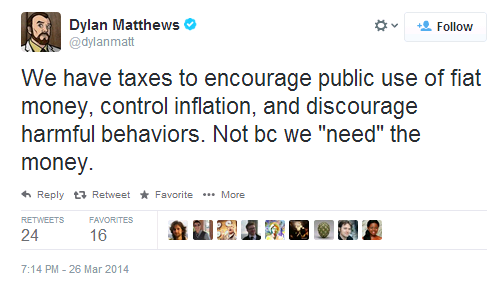Cochrane Monetary Policy with Interest on Reserves
Dear Warren,
Sorry not to respond more quickly; but I’ve been swamped with work!
However, I did a cursory reading of Cochrane’s paper which is extremely interesting. For a moment I thought that you must have been coaching him! What is amazing is that these people seem to be completely tribal and never look outside of their own clan or, if one were to be a bit more severe in one’s criticism, they are very much aware of what many of us say but they are just too afraid to cite us because that will then discredit them in the eyes of the mainstream. Hence, this is why he starts off with Friedman, Sargent & Wallace, et al. and seems to suggest that the monetary system has changed because of technological change leading to a diffusion of interest-paying electronic money and now interest on “base” money. All of this is nonsense because we could trace some of these same ideas literally to the nineteenth century within heterodox circles. Hence, to say that the gold standard was a fiscal policy commitment is hardly new and you could probably pull it out of someone as disparate as Karl Polanyi and, yet, it would seem that they are now rediscovering America!
But it is very interesting that he is saying many of the same things that we have been saying for quite some time. On the question of monetary policy, as you know, here we have been paying interest on “reserves” (or more correctly “settlement balances” in Canada, which is actually a more correct vocabulary than “reserves” … since the latter is perhaps suggestive of these “reserves” backing “inside” money, which is nonsense!) for over two decades, and this institutional change in the early 1990s was hardly because of technological change! It was to conduct more efficiently monetary policy when they realized that the control of monetary aggregates was completely futile. In much the same way, the whole issue of controlling the price level via fiscal policy is pure Abba Lerner!!
Hence, I’m really delighted to see that Cochrane is seeing the “light” and seems to understand reasonably well what he describes as the “political economy” concern of his findings. However, it is so depressing to see how “autistic” these people could be. There is not even one mention or reference to MMT or Chartalism, or Post Keynesianism, or anything of the sort! All these changes are merely a natural extension of Friedman 1969, which has been driven by changes in the monetary/technological landscape. That is just so phony and quite irritating to us who know better!
Thanks for the reference. I was unaware of the paper!
Best regards,
Mario


